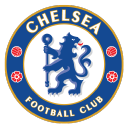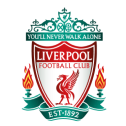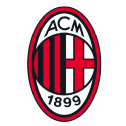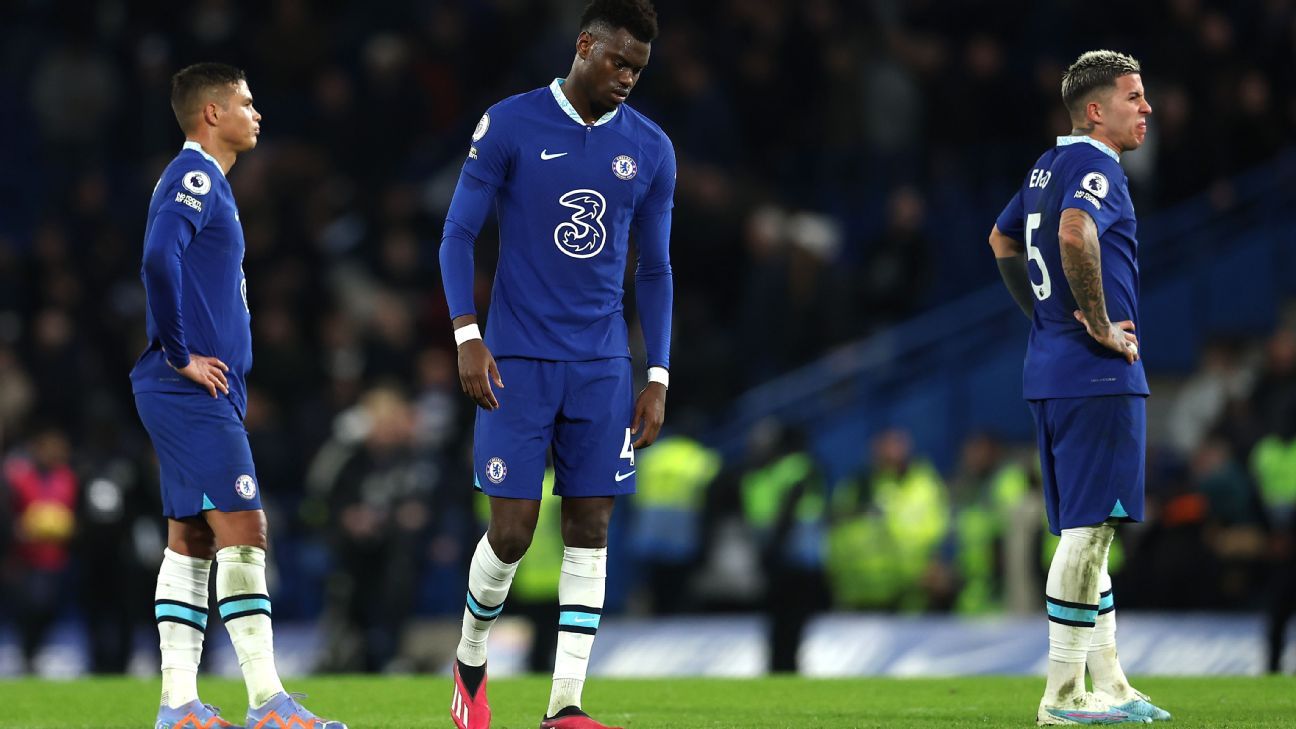The vibes are strange throughout the top of European soccer at the moment. The top teams in both the Premier League (Arsenal) and LaLiga (Barcelona) either didn’t qualify or didn’t advance to the Champions League knockout rounds, which begin just a week from now, and none of the actual favorites in the field are in particularly good form.
Since play resumed after the World Cup, Manchester City, the betting favorite, lost for the third time in six games and has lost to Southampton and drawn with Everton. The No. 2 favorite, Bayern Munich, briefly forgot how to score and just won its first league match in four tries. The No. 3 favorite, PSG, has dropped two of its past four league road games. The No. 4 favorite, Liverpool, has won one of its past seven matches in all competitions.
– Stream on ESPN+: LaLiga, Bundesliga & more (U.S.)
Be it post-World Cup fatigue or pure happenstance, things are pretty screwy. That could make for some fascinating round-of-16 results. But no matter how these next few weeks go, at least City (barring fast-moving sanctions, anyway), Bayern and PSG are all but assured of playing in next year’s Champions League. Liverpool? Chelsea (the No. 7 favorite)? Not so much.
Of the 32 teams that qualified for this year’s Champions League group stage, 19 were from Europe’s Big Five leagues: five from the Bundesliga (which snared an extra bid with Eintracht Frankfurt‘s Europa League win), four from the Premier League, LaLiga and Serie A and two from Ligue 1. Of those 19, FiveThirtyEight’s SPI ratings project six of them — Bayern, Barcelona, Real Madrid, Napoli, PSG and Manchester City — with at least a 98% chance of making next year’s field. Four more are at 70% or higher (Inter Milan, RB Leipzig, Borussia Dortmund, Marseille) and three are all but hopeless at 2% or lower (Bayer Leverkusen, Juventus, Sevilla).
That leaves six teams in between, including 2022’s Champions League runner up (Liverpool), 2021’s champion (Chelsea) and the defending Serie A champion (AC Milan). As we get ready to put our continental hats back on and dive into Europe’s biggest club competition, let’s talk about these six uncertain clubs and the varying levels of panic each should be feeling at the moment.
(Note: Teams are listed in order from worst odds to best. And in terms of panic, 1 means “we’re relaxed” and 5 is equivalent to “red alert.”)
 Chelsea
Chelsea
– Current position: ninth in the Premier League (10 points outside the top four)
– Odds of reaching next year’s Champions League, per 538: 5% to finish in the top four, 5% to win this year’s Champions League
– Results since restart: two wins, three draws and three losses in all competitions (1.1 points per game)
In college football, we talk a lot about “winning the offseason.” Did you recruit well? Did your new starting quarterback look good in spring ball? Did you avoid any silly suspensions or attrition in the dull summer months?
In some ways, the soccer version of this is winning the transfer windows, and Chelsea certainly did that. Back in the summer as the new ownership team led by Todd Boehly looked to make a splash, the Blues spent more than €280 million in transfer fees to bring in eight players, including veterans Raheem Sterling (from Manchester City), Kalidou Koulibaly (Napoli) and, for some reason, Pierre-Emerick Aubameyang (Barcelona), plus burgeoning young stars like Wesley Fofana (Leicester City) and Marc Cucurella (Brighton). A lot of these acquisitions came about with guidance from manager Thomas Tuchel … who was fired quickly after the summer transfer window closed.
Even in a free-spending Premier League, their moves stood out… and that was before a maniacal January, in which they added seven more transfers, all 22 or younger — including big-time prospects like Enzo Fernandez (Benfica) and Mykhaylo Mudryk (Shakhtar Donetsk) — for nearly €330 million more. They even brought in disgruntled Atletico Madrid striker Joao Felix on loan for good measure.
That’s more than €600 million in transfers since June, plus the second-highest payroll in the Premier League, per Spotrac. Congrats for winning the windows, Chelsea. You’ve earned many headlines for it.
Winning matches, however, has been a bit trickier, be it under Tuchel or replacement Graham Potter. When you spend more than half a billion Euros on transfer fees in a single season, you’d like to get something out of it in the short term, right? The only thing that Chelsea’s gotten is worse.
Changes in key Chelsea rankings from the past two seasons (Premier League only):
– Goals per match: from third in 2021-22 to 13th in 2022-23
– Shots per possession: from fourth to 12th
– xG per shot: from seventh to 15th
– Goals per match allowed: from third to fourth
– Shots per possession allowed: from third to sixth
– xG per shot allowed: from eighth to 14th
– xG differential: from third to 10th
Chelsea’s defense has gotten slightly worse this season, but it’s still pretty good. The attack, however, has collapsed. Chelsea signed seemingly every attacker in Europe, but has scored more than one goal in a match just once since Nov. 2. (They scored twice against Bournemouth in December, which barely counts.)
Panic level (1-5): 5
As we’ve seen with Arsenal’s success this season, not all transfers are designed to pay off immediately, especially when you go young. And to be sure, this is a pretty young team now. The transfers made sure of it, and key injuries to veterans like N’Golo Kante have only exacerbated things.
In Chelsea’s first post-window match last week, a 0-0 draw with Fulham, newcomers Fernandez (22) and Benoit Badiashile (21) played the whole match, and three more sparkly new additions — Mudryk (22), Noni Madueke (20) and David Datro Fofana (20) — combined for 105 minutes. Madueke led the team with a pair of chances created, and Fofana nearly won the match for Chelsea in the 79th minute only to have his shot cleared off the line by Tim Ream.
1:45
Laurens: PSG ‘furious’ with Chelsea for Ziyech breakdown
Julien Laurens explains why Hakim Ziyech was unable to complete a deadline day move from Chelsea to PSG.
In the American sports world from which Boehly came, even big-market, high-budget teams sometimes undergo youth movements and retooling jobs. In their first year with Boehly as part of the ownership team, the Los Angeles Dodgers went just 86-76 and missed the playoffs. They’ve since ripped off 10 straight playoff bids, with three World Series appearances and one championship.
As Gab Marcotti pointed out in the link above, however, Chelsea is toeing a pretty tenuous line when it comes to expenditures, especially since they’ve already committed to another big-money transfer for RB Leipzig’s Christopher Nkunku this coming summer. (What’s better than having 1,000 attackers? Having 1,001!) That line gets much more tenuous without Champions League revenue, and the combined odds of Chelsea playing in the Champions League next season are down to about 10%.
As a burgeoning youth movement, this project is intriguing. As a series of big-spending moves that need corresponding revenue to avoid long-term problems, this whole thing is awfully dicey at the moment.
 Liverpool
Liverpool
– Current position: 10th in the Premier League (11 points outside the top four)
– Odds of reaching next year’s Champions League, per 538: 15% to finish in the top four, 5% to win this year’s Champions League
– Results since restart: three wins, two draws and five losses in all competitions (1.1 points per game)
Liverpool’s travails are pretty well-established by now. The Reds came achingly close to winning four trophies last season; they won the FA and Carabao Cups, but finished second in the Premier League race and lost to Real Madrid in the Champions League final. They lost winger Sadio Mane and spent nearly all of their transfer budget on two attackers, forward Darwin Nunez (added in the summer) and winger Cody Gakpo (winter). They punted on addressing their thin and aging midfield, hoping to coax one more year of high quality and reliability out of players like Jordan Henderson (32), Fabinho (29), Thiago (31) and James Milner (37), who combined for more than 11,000 minutes in all competitions last season.
1:50
Nicol: Liverpool players need to step up
Steve Nicol reacts to Liverpool’s 3-0 defeat at the hands of Wolverhapton at the Molineux Stadium.
The gamble has backfired. Henderson and Thiago were both injured in August, and the midfield has been mediocre all season. So has Liverpool. A new attack has gone through some growing pains: Nunez has created 13.2 xG in all competitions (second on the team), but has turned it into only 10 goals thanks to a finishing slump, Gakpo has no goals or assists in 497 minutes, and injuries have limited Luis Diaz to under 1,000 minutes and Diogo Jota to under 500.
– O’Hanlon: Why Liverpool’s latest struggles feel different (E+)
The front line is neither scoring nor pressing as well as normal, and the transition defense has been abysmal, giving up nearly as many high-quality chances as Liverpool did two seasons ago, when all the center-backs were hurt. A whopping 61% of opponents’ shots come from inside the defending box, and 13% are worth at least 0.3 xG; both figures are highest in the league.
Changes in key Liverpool rankings from the past two seasons (Premier League only):
– Goals per match: from second in 2021-22 to fifth in 2022-23
– Shots per possession: from second to third
– xG per shot: from third to 12th
– Goals per match allowed: from first to 12th
– Shots per possession allowed: from second to third
– xG per shot allowed: from 15th to 20th
– xG differential: from second to sixth
At its best, Klopp’s Liverpool overwhelms opponents from the perspective of shot quantity and creates enough high-quality opportunities to account for opponents’ occasional high-xG breakaways. This season, the Reds’ quantity dominance has lessened slightly, and their shot quality has collapsed.
Panic level (1-5): 5
Liverpool have been a bit more unlucky than Chelsea overall — their xG differential ranks sixth to Chelsea’s 10th — but their recent form has been as bad or worse than that of the Blues. They’ve won only once since the calendar flipped to 2023, and that lone win (1-0 over 15th-place Wolves in the FA Cup) was counterbalanced by a 3-0 loss to Wolves over this past weekend.
At some point, both Nunez and Gakpo will emerge from their respective finishing slumps, other key players will find better form, and Liverpool will likely start generating more points. But 11 points and five teams stand between the Reds and their seventh straight Champions League bid. They need a run like the one they unleashed last winter and spring to bridge that gap, except they appear far less capable of delivering it at the moment.
 Tottenham
Tottenham
– Current position: fifth in the Premier League (one point outside the top four)
– Odds of reaching next year’s Champions League, per 538: 37% to finish in the top four, 5% to win this year’s Champions League
– Results since restart: five wins, one draw and three losses in all competitions (1.8 points per game)
That Spurs show up on this list tells you just how tricky life in the Premier League is at the moment. They just defeated Manchester City in league play, they won their (admittedly pretty easy) Champions League group, and despite a lengthy run of poor form from winger Son Heung-Min and a run of three losses in four league matches before the World Cup break, they are barely below last year’s pace — they averaged 1.87 points per game last year and are currently at 1.77.
Even with both Liverpool and Chelsea collapsing, however, Spurs are sitting in fifth place because Arsenal have surged, Manchester United have recovered a lot of its previously lost form and, perhaps most importantly (and unexpectedly), Newcastle United are far ahead of schedule. Spurs took six points from Newcastle last season, beating them by a combined 8-3, but they lost 2-1 at home to the Magpies back in October, and Newcastle currently leads them by a point with a game in hand. Two heavyweights have faltered, and the competition for the top four is still as stiff as ever.
1:32
Michallik: Few players in history score goals like Kane
Janusz Michallik explains what makes Harry Kane so good, as he becomes Spurs’ all-time top scorer.
That’s not to absolve Spurs of some iffyness, however. Their attacking numbers are nearly identical to last year’s despite Son’s funk (they averaged 1.82 goals per match in 2021-22 and are at 1.86 this year), but despite a bunker-and-counter mentality — their possession rate is just 50.1% this season, and they’ve accounted for just 44% of all touches in the attacking third — their defensive numbers have cratered.
Changes in key Tottenham rankings from the last two seasons (Premier League only):
– Goals allowed: from fourth in 2021-22 to 13th in 2022-23
– Shots allowed per possession: from 15th to 18th
– xG allowed per shot: from first to third
Like a lot of counterattacking teams, Antonio Conte’s Spurs are happy to let you attempt contested shots from longer distances. Even while ranking fourth in goals allowed last season, they were 15th in shots allowed per possession — most of those shots were low quality. This year, they’re allowing even more shots, and they’re allowing a higher percentage of good shots. They’ve allowed multiple goals in every league loss, and they have constantly fallen behind this season: Their goal differential of -0.2 per 90 possessions while tied ranks 11th in the league.
Panic level (1-5): 3
Son’s form has begun to rebound a bit: he has three goals and an assist in his past seven games in all competitions, which approaches the output from his first 21 games (five goals, two assists). Combined with Harry Kane‘s own form (seven goals in nine matches) and a return to 100 percent health for both Dejan Kulusevski and Richarlison, it all suggests exciting things about Spurs’ attack. But scoring hasn’t really been the issue.
Still, back-to-back 1-0 wins have perhaps hinted at defensive improvement, which might have come at an advantageous time: Six of their next seven opponents are 13th or worse in the Premier League table. Sturdy defense and an improving attack could result in a hot streak and a drastic improvement in Spurs’ Champions League odds.
 Eintracht Frankfurt
Eintracht Frankfurt
– Current position: fifth in the Bundesliga (one point outside the top four)
– Odds of reaching next year’s Champions League, per 538: 45% to finish in the top four, 1% to win this year’s Champions League
– Results since restart: two wins and two draws in all competitions (2.0 points per game)
Die Adler got into the Champions League the hard way last year, finishing 11th in the Bundesliga but beating Real Betis, Barcelona, West Ham and Rangers in succession to win the Europa League. Since they qualified for the Champions League knockout rounds, they can’t take the same path this time around; either they win the whole thing (unlikely) or they finish in top four in Germany.
Despite adding Champions League play to the docket, they have improved their key stats dramatically since last season.
Changes in key Eintracht rankings from the last two seasons (Bundesliga only)
– Goals per match: from 11th to second
– Shots per possession: from 13th to 15th
– xG per shot: from 15th to first
– Goals per match allowed: from eighth to fourth
– Shots per possession allowed: from fifth to third
– xG per shot allowed: from fifth to ninth
– xG differential: from 12th to fourth
Eintracht lost Filip Kostic, the Europa League’s Player of the Season, to Juventus in the summer, but replaced him with two of the season’s most inspired additions. Veteran Mario Gotze has stayed healthy (he’s at 2,161 minutes in all competitions) and has led the team with 35 chances created and 5.1 expected assists (xA), but he has been only the team’s second-best addition.
Up front, 24-year old Randal Kolo Muani, brought in via a free transfer from Nantes, has 12 goals and 11 assists in all competitions. His form was good enough to earn him a spot on France‘s World Cup roster, and said form might have actually improved since Bundesliga play resumed: He has scored four goals in his past three matches. Eintracht still doesn’t shoot as much as the average Bundesliga team, but with Kolo Muani, Gotze and the endlessly creative Jesper Lindstrom, their shot quality has skyrocketed.
Like Tottenham, however, Eintracht’s biggest issue is the depth of challengers as much as anything. Both RB Leipzig and Borussia Dortmund have been excellent since the restart, and like Dortmund, stubborn underdog Union Berlin has won every match since the restart. Eintracht is just five points behind league leader Bayern but sits in just fifth place. They’re only a point ahead of sixth-place Freiburg, too.
Panic level (1-5): 3
Eintracht’s underlying xG figures suggest they’ve been a bit lucky since the restart: they’ve taken eight points from four matches, but their xG differential is minus-0.6 per match. Granted, their xG differential for the season is better than either Union’s or Freiburg’s, but it’s hard to say their current form will guarantee them a top-four finish. They might have to kick things up a notch despite having a knockout round battle with Napoli on the horizon.
 AC Milan
AC Milan
– Current position: sixth in Serie A (zero points outside the top four)
– Odds of reaching next year’s Champions League, per 538: 50% to finish in the top four, 1% to win this year’s Champions League
– Results since restart: one win, two draws, five losses in all competitions (0.6 points per game)
Oh, dear. For as poorly as Chelsea and Liverpool are playing, their struggles do not hold a candle to those of the defending Scudetto winners. Their odds of finishing in the top four in Serie A are still solid, both because of a good start to the season and because of Juventus’ recent 15-point penalty (and virtual elimination from top-four contention). But trends are… not kind to the Rossoneri.
Their results since the restart:
– Road win over Salernitana (currently 16th in Serie A), 2-1. Fine.
– Home draw with Roma (third), 2-2. Not optimal, but fine.
– Extra-time home loss to Torino (seventh), 1-0, in the Coppa Italia. Not great.
– Road draw with Lecce (14th), 2-2. Unnecessary.
– Blowout loss to Inter (second), 3-0, in the Supercoppa Italiana in Saudi Arabia. Oh no.
– Blowout road loss to Lazio (fourth), 4-0. OH NO.
– Blowout home loss to Sassuolo (15th), 5-2. WHAT IN THE WORLD.
– Another loss to Inter, 1-0, in league play.
After getting outscored 12-2 in their previous three matches, you could say that the 1-0 defeat was a step in the right direction. Maybe. Their defense held Inter to only a couple of quality chances and 0.87 xG over 15 shots, which, after getting torched repeatedly, is indeed an improvement. But they also got shut out for the third time in four matches (and for the second time in a row against Inter) and managed just four shots worth 0.32 xG. Which is to say they created almost nothing.
Panic level (1-5): 5
Milan’s solid pre-World Cup run gave them some margin for error, but they’ve just about used it up by being one of the worst teams in Serie A over the past month. They’ve averaged just 0.8 points in league play since the restart, and their xG differential in that span (-0.5 per match) ranks 16th, almost relegation worthy.
Their defense has been problematic all season — they’re allowing 1.4 goals per match (13th) and 0.10 xG per shot (also 13th) in league play — and has gotten worse since an injury to goalkeeper Mike Maignan. They’ve allowed the most set-piece goals in the league while scoring the second-fewest, and now their open-play attack has disappeared, too. It’s not just a finishing slump either: Their six goals in the past seven matches have come from shots worth just 6.3 xG.
They spent €32 million on attacker Charles De Ketelaere, who has yet to score in 24 matches this season, and they are as reliant as ever on 36-year old Olivier Giroud — who, along with club teammate Theo Hernandez, played deep into the World Cup with France — for goals.
After a long series of excellent moves in recent years, the roster has grown stale, and Stefano Pioli has yet to find answers. If the answers appear, they could rally to a semi-easy top-four finish. But said rally better begin soon.
 Atletico Madrid
Atletico Madrid
– Current position: fourth in LaLiga (three points ahead of fifth place)
– Odds of reaching next year’s Champions League, per 538: 59% to finish in the top four
– Results since restart: six wins, three draws and one loss in all competitions (2.1 points per game)
Diego Simeone’s squad left itself with some work to do this season. At the break, Atleti were fifth in LaLiga, tied with both Athletic Club and Real Betis at 24 points and narrowly ahead of three other teams (Osasuna, Rayo Vallecano and Villarreal). And after finishing last in a pretty weak Champions League group, they ditched some salary as well, loaning out forwards Joao Felix (to Chelsea) and Matheus Cunha (to Wolves) and selling defender Felipe to Nottingham Forest. They brought in Memphis Depay from Barcelona via cheap transfer, but he has played only 20 minutes for them.
No matter!
Despite the turnover and despite finishing the fall in poor form, Atleti has found solid form in the new year. They’ve lost only to Barcelona, and even that was an unfortunate result: They doubled Barcelona’s shot attempts (20 to 10) and nearly tripled their xG (1.84 to 0.66). Draws with Almeria and Getafe have prevented them from steering further from danger, but with other top-four contenders faltering — Villarreal have lost twice in a row, Real Betis have lost three of four, and Athletic just won their first league match in six tries — they have still built a bit of a cushion.
Panic level (1-5): 2
They have the best xG differential in LaLiga and they’re third in points, since the restart. That’s despite both turnover up front — they released Luis Suarez over the summer, then temporarily offloaded Felix — and a miserable finishing slump from Antoine Griezmann, who has attempted 24 shots worth 3.0 xG but scored only once. Their defense has rounded nicely into Simeone-esque form, and their attack will likely progress to the mean soon, especially if Depay finds a rhythm.
Even with Real Sociedad looking like it has staying power in third place, it’s hard to pick against Atletico to fill the fourth Champions League spot in LaLiga.
